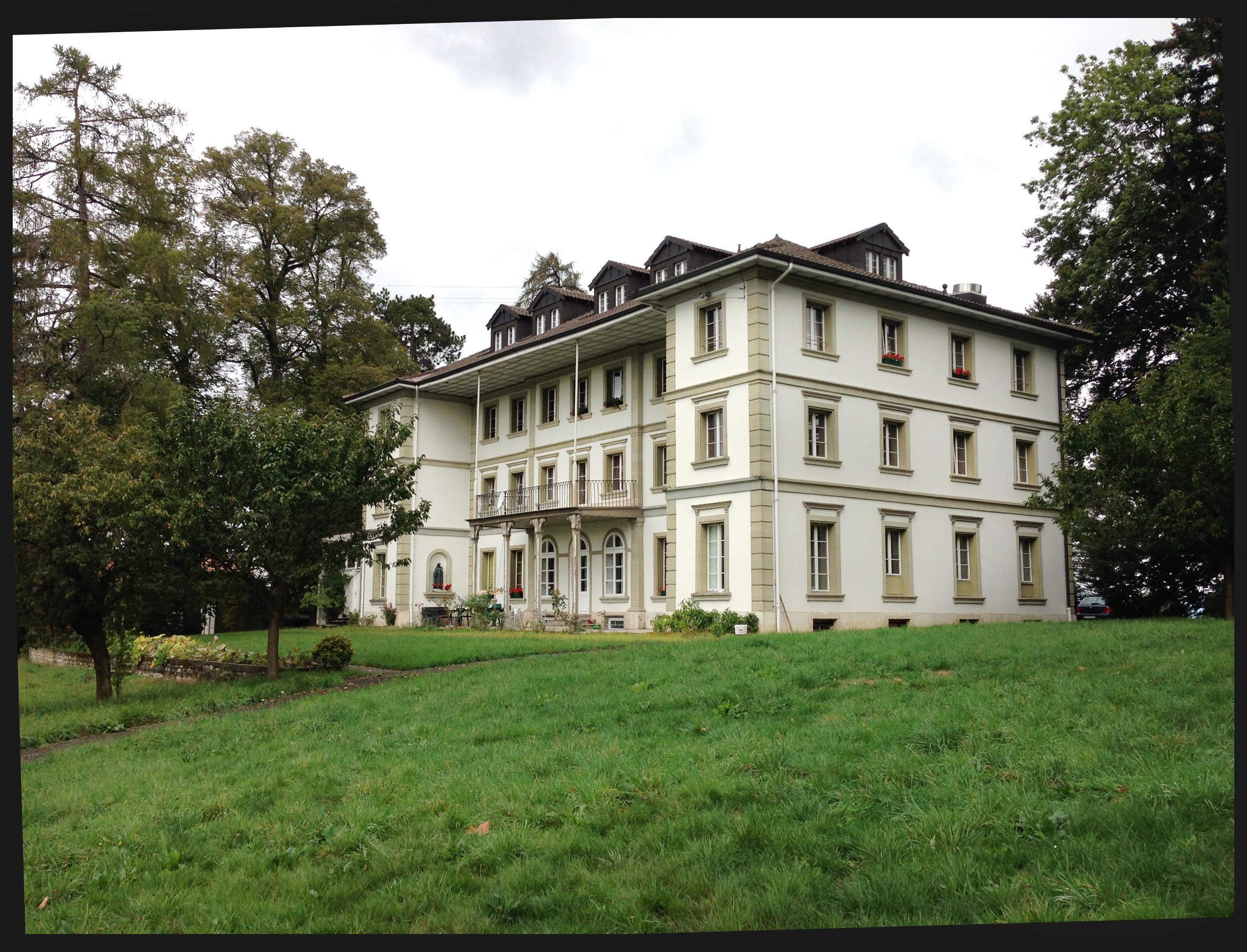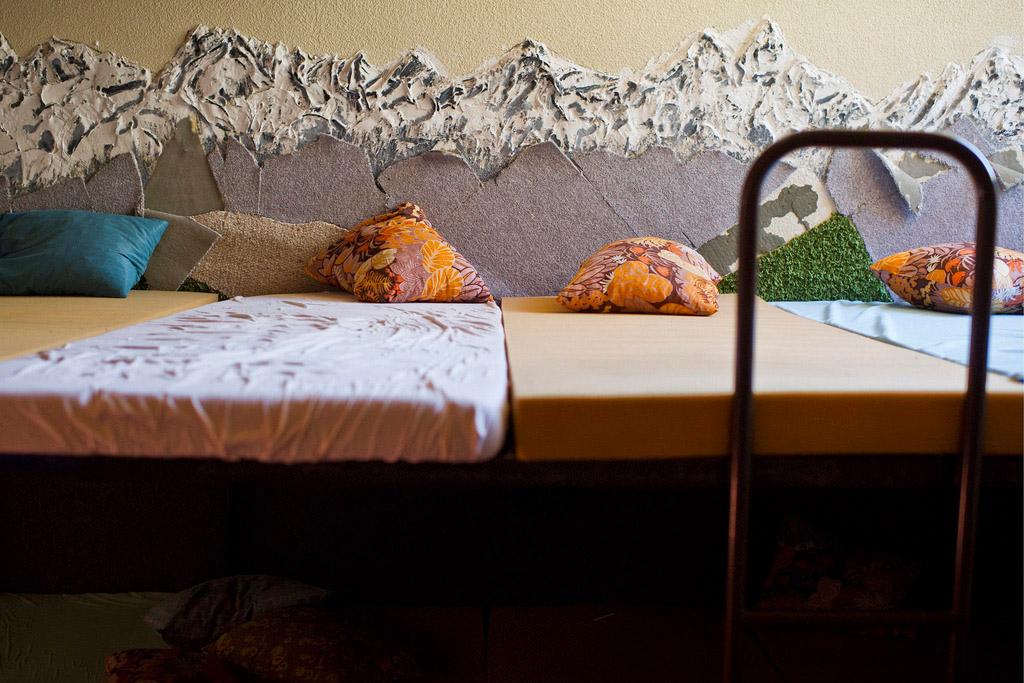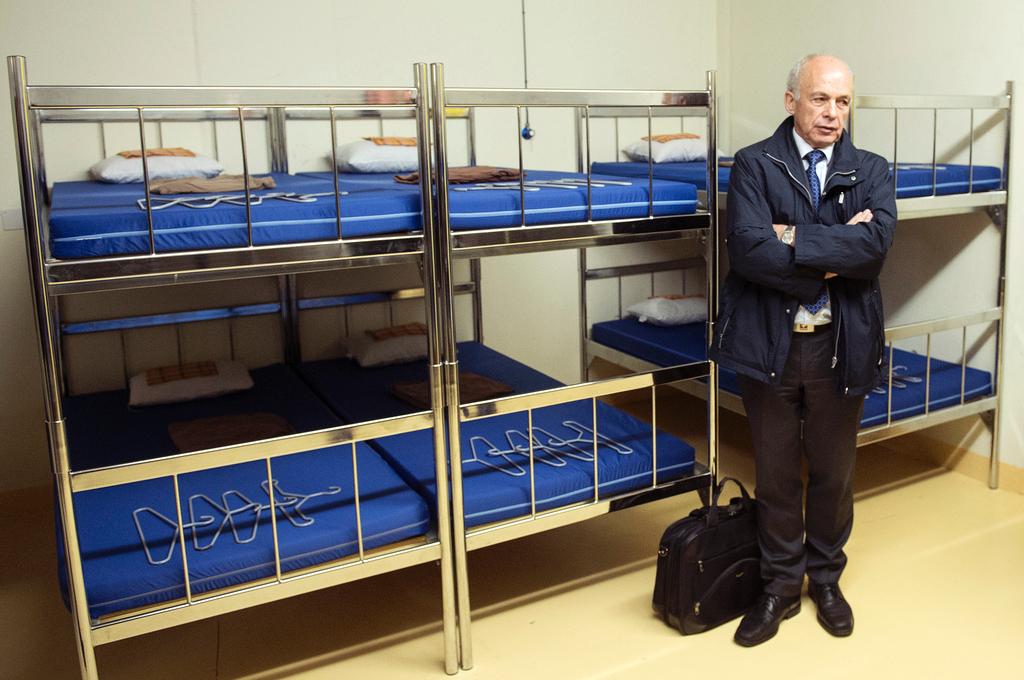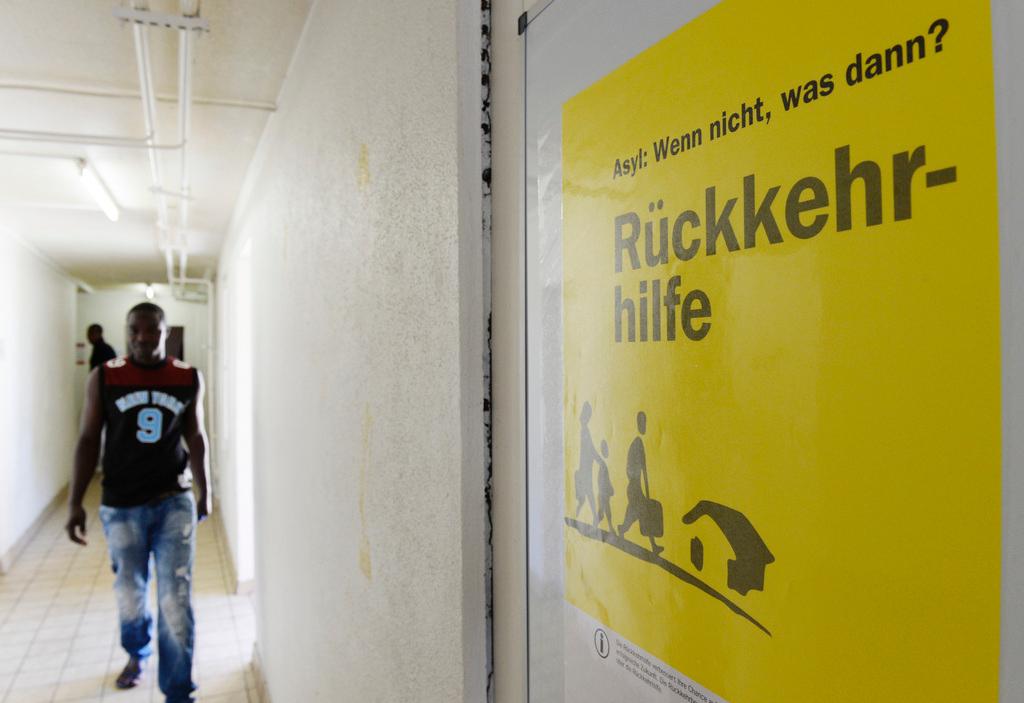An asylum seeker’s home is his castle

A historic mansion in canton Fribourg is opening its doors soon to asylum-seekers. But the unusual choice is not quite what it seems. swissinfo.ch looks at current housing challenges and solidarity in the region, as it prepares for new arrivals.
From the south-facing terrace of the Château de Rosière, a 19th-century mansion at the entrance to the village of Grolley, the Alps and the Jura mountains are just visible above rolling fields and forests.
Jean-Baptiste Henry de Diesbach is particularly attached to the huge three-storey house. One of his relatives, Alphonse de Diesbach, a Swiss army officer, once owned the property over 150 years ago.
“It’s not a palace. The building could be turned into luxurious apartments, but that’s not what the church wants to do,” said de Diesbach.
The house, owned by a foundation linked to the local Catholic diocese, has a tradition of welcoming people in need: from Carthusian monks expelled from France to Belgian refugee children during the First World War. Since the 1960s, it has become a spiritual retreat; it is currently inhabited by a small group of Romanian nuns.
Crossing the worn stone threshold, the grand exterior is soon forgotten, however. Renovations are costly and the interior is basic and slightly rundown. Yellow-carpeted walls and orange plastic chairs transport us back to the 1970s.
For the current owner, the Fondation Notre-Dame de la Nativité, who de Diesbach works for, the plan to let the state house 100 asylum-seekers there – mostly families from Syria as well as young Eritrean men – makes sense.
“There is a willingness to use the house according to the values of the church. The church’s role and duty is to welcome foreigners who are in difficulty. That’s what Jesus once said,” said de Diesbach.
“Fear of the unknown”
Not everyone is happy about the idea, however. Some 750 locals protested via a petition, calling for the foundation to abandon the project and to put the historic building to other uses.
“Behind all that (opposition) there is a fear of the unknown, a fear of things that are different. And this leads to aberrant situations where people sign a petition and say it’s not the right place to house asylum-seekers without ever having seen the chateau,” said de Diesbach.
“People who signed the petition argue it’s scandalous to privilege foreigners over Swiss. But we do lots of things for Swiss people here. But in this case there is an urgent need to house asylum-seekers.”
In a sharply worded reply to the Grolley opponents sent in early September, the Fribourg government rejected the petition underlining the ongoing ‘humanitarian dramas’ of people fleeing war zones for Europe. The authorities added that the decision had been taken as “signs of solidarity” were increasingly widespread among the Fribourg population. On September 9, the local prefecture authorities gave the foundation the green light. People should start arriving in the coming weeks for 2-4 month periods.
“Avoid the subject”
At the Centurion café in the centre of Grolley, many of swissinfo’s attempts to engage locals on the issue were rebuffed.
“It’s a subject which is avoided,” said Christian Ducotterd, who signed the petition and lives next door to the chateau.
“The building has a great deal of character with its beautiful garden and location with fantastic views of the Alps. It could have been developed in another way. The canton missed an opportunity there to do something really good with this building,” he declared, insisting that he was commenting on a personal basis and not in his position as mayor of Grolley.
Laura Ansermot, who lives nearby, said she understood villagers’ fears: “One hundred people is quite a lot for a small village [of 1,900 inhabitants]. Everyone knows each other. This is the countryside.”
Which is also why it is a bad decision, said Stéphanie Rouiller, a local nurse.
“I’m not against the asylum-seekers but I wonder whether the place is really adapted. They are going to be dropped in the middle of the countryside and they will get completely bored,” she said. “We need to integrate them, but what do we do, put them in a castle at the top of a village? In the city of Fribourg there are much better places available.”

More
Providing emergency shelter
Swiss migration officials anticipate 29,000 asylum applicants for 2015, an increase on recent years but below peaks in the 1990s. However, the State Secretariat for Migration recently warned the 26 cantons they might have to accommodate more arrivals. Up to 1,150 people a week could be placed with the cantons, the federal authorities say – a 15% increase.
Canton Fribourg, which takes 3.6% of all asylum seekers, has seen the number of new arrivals rise from 50 a month during the first five months of the year to over 135 in September. The canton is urgently looking for new solutions, as its 1,700 accommodation places are full.
Several local groups are assisting. In September, a group of Fribourg residents known as ‘Osons l’accueil’ launched a hotline to coordinate people willing to accommodate refugees. They describe it as a ‘simplified’ version of a similar initiative by the non-governmental Swiss Refugee Council.
The response has been “impressive”, said organiser Bernard Huwiler. Since the beginning of the month, 90 families have agreed to take in migrants, and they have had 60 offers of private language courses, transport and meals.
The Fribourg Catholic Church also announced an asylum housing initiative last month. Following Pope Francis’ unprecedented gesture to every Catholic parish, religious community and sanctuary in Europe to take in a family of refugees, the Catholic Church in Fribourg made an appeal to its 200 parishes.
But so far there have been no definite offers of help, said Véronique Benz, spokeswoman for the Catholic Church in canton Fribourg: “We know that things are moving and people are talking about it. But some of the parish councils only meet once a month.”
Waves of solidarity
Officials say it is difficult to gauge the extent of these new waves of solidarity following the dramatic images of refugees rescued at sea and crossing Europe on foot.
“It’s mixed,” said Ducotterd. “I think people have stronger feelings about really wanting to help those in difficulty. Yet at the same time they are afraid and wonder how things will happen with integration in the future. Sometimes it’s the same people who have the same feelings.”
Claudia Lauper-Luthi, a scientific adviser at canton Fribourg’s health and social affairs directorate, agreed it was hard to say if there had been an increase in local solidarity.
“When we open a new asylum centre, we get lots of calls from people asking what they can do to help. We’ve had lots of offers of people giving clothes. Communes recently agreed to open new asylum accommodation centres or apartments like in Bösingen and Villars-sur-Glâne. We have had lots of offers from people and great openness, but we still encounter opposition,” she explained.

In compliance with the JTI standards
More: SWI swissinfo.ch certified by the Journalism Trust Initiative






You can find an overview of ongoing debates with our journalists here. Please join us!
If you want to start a conversation about a topic raised in this article or want to report factual errors, email us at english@swissinfo.ch.